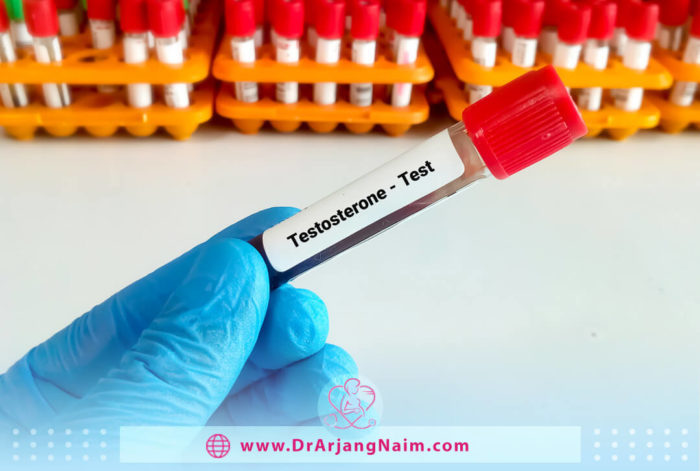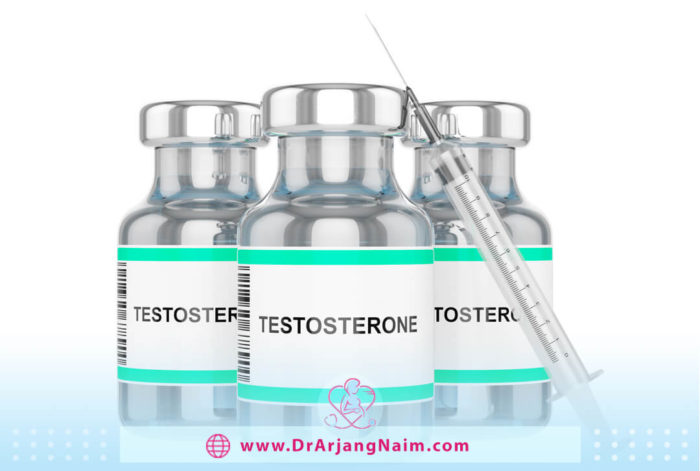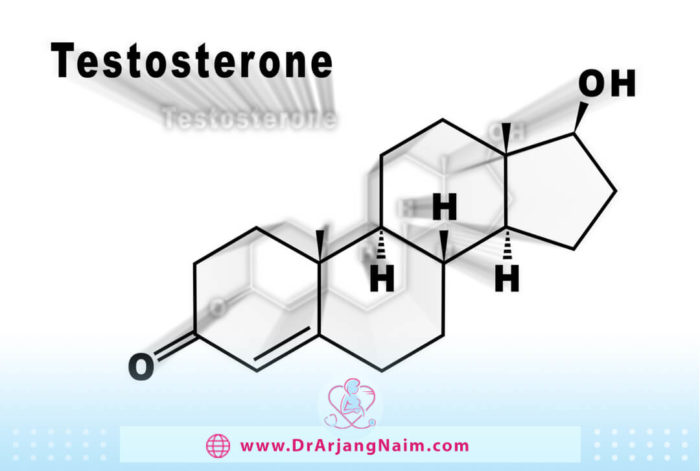Low testosterone (male hypogonadism) is when the testicles do not produce enough hormones. Testosterone is a hormone found in humans as well as other animals. In men, the testicles primarily make it. Women’s ovaries also produce very small amounts. Testosterone production begins to increase significantly during puberty and declines after the age of 30 or older.
It is often associated with sexual desire and plays a vital role in sperm production. It also affects bone and muscle mass, how men store fat, and even the production of red blood cells. The level of this hormone in the body is constantly changing in response to the body’s needs. However, its overall level in the body also changes throughout life.
What is testosterone?
It is a hormone that is responsible for the development of male sexual characteristics. Hormones are chemical messengers that cause the necessary changes in the body. Women also usually produce small amounts of it.
It is a type of androgen mainly produced by the testes in cells called Leydig cells. In men, it is thought to regulate a number of functions in addition to sperm production. This includes:
- Sex drive
- Bone mass
- Fat distribution
- Muscle size and strength
- Red blood cell production
Without enough hormones, men become infertile because it helps mature sperm grow. Although it is a male sex hormone, it also helps women’s libido, bone density, and muscle strength. However, overproduction in women can cause male pattern baldness and infertility. The brain and pituitary gland control levels. After production, the hormone travels through the bloodstream to perform various important functions.
Signs of low testosterone in men

The production of this hormone usually decreases with age. Men can experience a wide range of symptoms if their production is reduced too much. Low T is detected when the level is less than 300 ng / dL . According to the Food and Drug Administration, the normal range is usually between 300 and 1000 ng / dL.
Low sex drive
Testosterone plays a key role in sexual desire in men. Some men may experience decreased libido as they get older. However, people with low T are likely to experience a more severe decline in their desire for sex.
Difficulty with erection
This hormone stimulates sexual desire in men and helps achieve and maintain an erection. Testosterone alone does not cause an erection but stimulates receptors in the brain to produce nitric oxide. Nitric oxide is a molecule that helps to create a series of chemical reactions necessary to create an erection. When testosterone levels are too low, a man may have trouble getting an erection before sex or having an erection on his own. Often, other health problems also play a role in erection problems. These can include the following:
- Diabetes
- Thyroid problems
- High blood pressure
- High cholesterol
- Depression
- Stress
- Anxiety
- Smoking
- Alcohol use
Low semen volume
Testosterone is involved in producing semen, which is a milky-colored fluid that helps sperm move. Men with low T often notice decreased semen volume during ejaculation.
Hair loss
Testosterone is involved in several body functions, including hair production. Baldness is a natural part of aging for many men. While baldness has an inherited component, men with low T may also experience body and facial hair loss.
Fatigue
Men with low T suffer from severe fatigue and low energy levels. If a person is always tired despite having a lot of sleep, or if the motivation to exercise is more difficult, it may be because of a low T.
Loss of muscle mass
Because testosterone is involved in building muscle, men with low T may notice a decrease in muscle mass.
Decreased bone mass
Osteoporosis, or thinning of the bone mass, is a condition that is often associated with women. However, men with low T can also experience bone loss. Therefore, men with low T, especially older men, have less bone volume and are more prone to bone fractures.
Increased body fat
Men with low T may also experience an increase in body fat. In particular, they sometimes develop gynecomastia or breast enlargement.
Mood changes
Men with low T can experience mood swings. Because it affects many physical processes in the body, it can also affect mood and mental capacity. Men with low T are more likely to experience depression, irritability, or lack of concentration.
Smaller testicle size
Low levels of this hormone in the body can cause the testicles to be smaller than average. Because the body needs testosterone to grow the penis and testicles, low levels make the penis or testicles smaller.
Affected memory
Testosterone levels and cognitive functions (especially memory) decrease with age. As a result, doctors have theorized that lowering levels could also affect memory.
Signs of low testosterone in females

Women may also experience certain symptoms of low T.
Hot flashes
While many women associate hot flashes with estrogen levels that fluctuate during menopause, low testosterone levels may also cause this symptom.
Irregular menstrual cycles
Low levels of this hormone can cause hormonal imbalances that lead to shorter or longer than average menstrual cycles.
Vaginal dryness
Vaginal dryness is common during and after menopause but can occur at any age. It is usually caused by low estrogen, but low testosterone can also be a stimulant.
Anemia
This hormone helps the body produce healthy red blood cells (RBCs). Low levels can lead to anemia, a blood disorder caused by a decrease in red blood cells, the most obvious sign of which is fatigue.
How common is low testosterone?
Low T affects approximately 40% of men 45 years of age and older. It is difficult to determine normal testosterone levels because levels vary throughout the day and are affected by body mass index (BMI), nutrition, alcohol consumption, medications, age, and disease.
Low testosterone causes in men
Reasons for low hormone levels include:
- Aging
- Delayed puberty
- Testicular damage (caused by alcoholism, testicular damage, or mumps)
- Pituitary disease
- Noncancerous pituitary tumor
- Chemotherapy
- Hypothalamic disease
A number of genetic diseases can also be affected, including:
- Klinefelter syndrome
- Kallmann syndrome
- Myotonic dystrophy
Diagnosis

A blood test measures the amount of testosterone in the blood. If the doctor wants to test the hormone level in the blood, he will most likely set a time of day for the test. Hormone levels are at their highest in the morning, so this test is often done between 7:00 and 10:00 in the morning. The doctor may ask to test more than once and may ask to stop taking certain medications before the test, as they may affect the test result.
The doctor will order other tests to assess whether the testicles or pituitary gland is the problem. Some of them are:
- Luteinizing Hormone (LH): This test helps your doctor find the cause of low testosterone. LH controls how hormones are produced. Abnormal levels may indicate a problem with the pituitary gland.
- Blood Prolactin Level: High levels of this hormone secreted by the pituitary gland may indicate a pituitary problem.
- Blood Hemoglobin: Low hemoglobin and low testosterone are related. Hemoglobin is a protein in red blood cells. The oxygen that enters the lungs binds to the hemoglobin in the blood and is then transported to the body’s tissues.
How to increase testosterone levels
There are many ways to increase testosterone levels. Certain lifestyle changes, such as resistance training and weight loss, can help increase levels. Exercise, especially cardiovascular exercise, can help with weight loss, which can also help increase hormone levels.
Food
Some foods may help the body regulate hormone levels. Ensuring a diet rich in zinc and vitamin D helps keep testosterone at a normal level. Foods that increase levels include:
- Fatty fish: Fatty fish such as salmon and sardines are rich in nutrients that are important for hormonal health, such as vitamin D, zinc, and omega-3 fatty acids.
- Dark, leafy greens: Dark leafy vegetables are a great source of micronutrients, including magnesium, a vital mineral for maintaining optimal levels, especially in older men. Magnesium increases the biological activity of testosterone in the body because magnesium reduces oxidative stress. Oxidative stress is an imbalance between antioxidant defenses and free radicals in the body. Oxidative stress and inflammation can lower hormone levels, so introducing nutrients to fight oxidative stress may help maintain them.
- Cocoa products: Cocoa products such as cocoa powder and cacao nibs are rich in magnesium and flavonoid antioxidants, both of which are important for testosterone. Flavonoids are plant compounds with strong antioxidant and anti-inflammatory effects on the body. Certain flavonoids, including cocoa flavonoids such as quercetin and apigenin, may help increase testosterone production by testicular cells called Leydig cells.
- Avocados: Avocados provide healthy fats that are important for hormonal health. In addition, avocados contain magnesium and a mineral called boron, which studies show may be good for testosterone levels.
- Eggs: Egg yolk is rich in healthy fats, proteins, and selenium, a mineral that acts as an antioxidant in the body.
- Berries, cherries, and pomegranates: Berries, cherries, and pomegranates are rich in flavonoid antioxidants that may help protect testosterone-producing cells from damage and increase production.
- Shellfish: Shellfish like oysters and clams are excellent sources of zinc, selenium, and omega-3 fatty acids, all of which may support optimal hormone levels. Due to its important role in reproductive health, zinc deficiency can cause hypogonadism.
Replacement therapy
Replacement therapy is used to help treat people with abnormal levels. Abnormally low levels can affect the body’s normal functioning and may help reduce muscle mass, libido, erectile dysfunction, and mood swings such as irritability and depression. Alternative therapies include prescribed medications in the form of tablets, adhesives, and gels applied to the skin.
Injections

The injection is one of the most common forms of alternative therapy.
Side effects
Replacement therapy has many risks. If you have testosterone replacement therapy, you may experience the following side effects:
- Fluid retainment
- Acne
- Prostate enlargement
- Reduced fertility
- Sleep apnea
- Blood clots
- Increased red blood cells
What are the benefits of testosterone replacement therapy?
Potential benefits of replacement therapy may include:
- Loss of fat
- Improved sexual function
- Improved mental sharpness
- Avoid problems with delayed puberty in boys
- Improved mood and sense of well-being
- Increased bone density and protection against osteoporosis
- Greater muscle strength and physical performance
Can low testosterone be prevented?
There is no known way to prevent testosterone depletion due to genetic conditions or damage to the testicles or pituitary gland. A healthy lifestyle that includes good nutrition, exercise, weight management, and avoiding alcohol and drug overdoses can help keep hormone levels normal.
When to see a doctor
According to the American Urological Association, you should see a health care professional if you have any of the following symptoms:
- Reduced lean muscle mass
- Irritability
- Symptoms of depression
- Reduced sex drive
- Reduced erectile function
- Fatigue
The bottom line
Unlike women who experience a rapid drop in hormone levels during menopause, men experience a gradual decline in hormone levels over time. The older a man is, the more likely he will experience lower-than-normal levels. However, these levels can be very low in some people and cause unwanted symptoms. Treatment is available, but your doctor needs to confirm low T levels with one or more blood tests. Your doctor may also perform other tests to help determine what is causing the reduction. In women, very high, not very low, testosterone levels are more worrying. Symptoms of high testosterone may be a sign of an underlying condition that needs treatment.
Dr. Arjang Naim, MD measures testosterone levels by performing various tests and offers the best treatment strategy according to the symptoms and their cause.
Additional questions
1. Can alcohol and drugs affect testosterone levels?
Yes. Research shows that harmful use of alcohol and drugs can affect sex hormones, including lowering testosterone. Alcohol and drug abuse are recognized as potentially reversible causes of hypogonadism.
2. What are the foods that lower testosterone levels?
- Soy and soy-based products
- Mint
- Licorice root
- Vegetable oil
- Flaxseed
- Processed foods
- Alcohol
- Nuts
3. What is a natural testosterone booster?
- Get a good night’s sleep
- Lose that excess weight
- Get enough zinc
- Go easy on the sugar
- Get some good old-fashioned exercise
4. Can low testosterone cause diabetes?
Low T levels in men are a risk factor for type 2 diabetes. Testosterone helps the body’s cells raise glucose or blood sugar in response to insulin, the hormone that regulates glucose. Reducing it can affect insulin resistance. This causes the body to produce more insulin to keep glucose levels regular. When cells are full of glucose, the body stores excess amounts in fat cells, leading to diseases such as type 2 diabetes and obesity.
5. Does low testosterone affect fertility?
About 15% of men with fertility problems have low testosterone levels. However, low hormones do not cause infertility. Low T may be a sign of testicular dysfunction that causes infertility rather than infertility in people with fertility problems.
References:
https://www.healthline.com/nutrition/foods-that-lower-testosterone#TOC_TITLE_HDR_3
https://www.healthline.com/health/low-testosterone/warning-signs#_noHeaderPrefixedContent
https://www.medicalnewstoday.com/articles/322647#in-males
https://www.endocrineweb.com/conditions/low-testosterone#treatment




